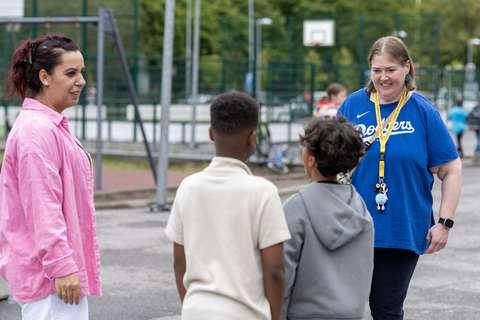Pupils’ inclusion and wellbeing improved by school assistant training at Kirstin koulu school

Kirstin koulu school of the City of Espoo has developed training for school assistants for encountering pupils. Principal of Kirstin koulu school, Pauliina Pertamo, states that school assistants have always been an integral part of the staff at Kirstin koulu school and involved in all joint events.
The school assistants themselves wished for more tools and skills for encountering pupils. This would allow them to further add to the pupils’ experiences of inclusion and wellbeing. There were situations especially during recess where more tools were needed to intervene in challenging situations.
“It is important that all adults in the school act the same way and that everyone feels that they are part of the school as a whole. Common practices help both adults and children,” Pertamo says.
Internationality is part of everyday life at school
Approximately 94% of the pupils of the language and culture savvy Kirstin koulu school speak a language other than Finnish at home. In other words, internationality is integral to everyday life at school, and the entire staff from teachers to school assistants help integrate the pupils.
The need for training was first discussed in the Kirstin koulu school’s management team. Class teacher Miiamari Kääriäinen assumed responsibility for organising the training.
Kääriäinen told us that as third parties did not offer the required training, the school decided to organise the training independently. Kääriäinen and special needs teacher Johanna Häkkinen created a suitable training package.
They organised 45-minute training sessions every two weeks at the beginning of 2025. The training focussed on encounters and finding solutions with pupils. The topics included differences in different approaches and what restorative and empowering support mean, to mention a few. The goal of encounters is to give the children a sense of accomplishment.
“For example, the purpose of restorative support is to improve the pupil’s quality of life and support their functional capacity,” Kääriäinen explains.
“We also discussed gaze guidance, for example: What power an adult’s gaze holds? Or what are the differences between ‘me’ and ‘you’ signals? The signal often easily turns into a ‘you’ signal, but the ‘me’ signal is better at solving problems.”
What has changed?
Kääriäinen and Pertamo have noticed that school assistants have become more open to discussing challenging situations with teachers.
School assistants now also seek more peer support from each other, as it was found in the training that almost all of them faced similar issues. School assistants also feel that they now have more courage to intervene in difficult situations.
What about pupils? Pupils feel that the atmosphere during recess is now better, and their games go smoother than before.